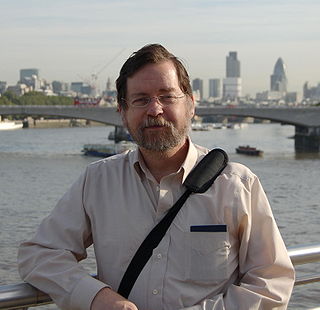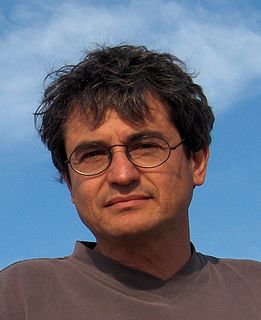A Quote by PZ Myers
We godless lack that certainty, and we know the world is a complex place that requires compromise and is not ruled by a moral force - virtue is subject to negotiation, and is found in working together with others to find mutually satisfactory solutions. Good is not absolute, it is an emergent property that arises from successful networks of individuals. It is also something that is measured by evidence: we look at the good that people do, not the promises that they make and never keep, or the lies that dovetail nicely into dogma. Competence is a virtue. Intent is meaningless without action.
Quote Topics
Absolute
Action
Also
Arises
Certainty
Competence
Complex
Compromise
Dogma
Evidence
Find
Force
Found
Godless
Good
Individuals
Intent
Keep
Know
Lack
Lies
Look
Make
Meaningless
Measured
Moral
Mutually
Negotiation
Networks
Never
Nicely
Others
People
Place
Promises
Property
Requires
Ruled
Satisfactory
Solutions
Something
Subject
Successful
Together
Virtue
Without
Working
Working Together
World
Related Quotes
If a man of good natural disposition acquires Intelligence [as a whole], then he excels in conduct, and the disposition which previously only resembled Virtue, will now be Virtue in the true sense. Hence just as with the faculty of forming opinions [the calculative faculty] there are two qualities, Cleverness and Prudence, so also in the moral part of the soul there are two qualities, natural virtue and true Virtue; and true Virtue cannot exist without Prudence.
Do unto others…’ is a good rule of thumb. I live by that. Forgiveness is probably the greatest virtue there is. But that’s exactly what it is - a virtue. Not just a Christian virtue. No one owns being good. I’m good. I just don’t believe I’ll be rewarded for it in heaven. My reward is here and now. It’s knowing that I try to do the right thing. That I lived a good life. And that’s where spirituality really lost its way. When it became a stick to beat people with. ‘Do this or you’ll burn in hell.’ You won’t burn in hell. But be nice anyway.
If then, as we say, good craftsmen look to the mean as they work, and if virtue, like nature, is more accurate and better than any form of art, it will follow that virtue has the quality of hitting the mean. I refer to moral virtue [not intellectual], for this is concerned with emotions and actions, in which one can have excess or deficiency or a due mean.
We strive towards a better world, but one can never do it without compromise. We can all change the world for the better, starting in your own little surroundings, together with people who believe in it, too. This way you can make it work and show others that it actually can work. That doesn't mean that everybody has to do it like you "or else..." If there is no compromise possible, then it turns into extremism, and I don't think that extremism ever added something positive to the world.
In [the soul] one part naturally rules, and the other is subject, and the virtue of the ruler we maintain to be different from that of the subject; the one being the virtue of the rational, and the other of the irrational part. Now, it is obvious that the same principle applies generally, and therefore almost all things rule and are ruled according to nature.
Souls that have lived in virtue are in general happy, and when separated from the irrational part of their nature, and made clean from all matter, have communion with the gods and join them in the governing of the whole world. Yet even if none of this happiness fell to their lot, virtue itself, and the joy and glory of virtue, and the life that is subject to no grief and no master are enough to make happy those who have set themselves to live according to virtue and have achieved it.
But the most important lesson I have learned in my twenty years or research on morality is that nearly all people are morally motivated. Selfishness is a powerful force, particularly in the decisions of individuals, but whenever groups of people come together to make a sustained effort to change the world, you can bet that they are pursuing a vision of virtue, justice, or sacredness.
The very foundation of science is to keep the door open to doubt. Precisely because we keep questioning everything, especially our own premises, we are always ready to improve our knowledge. Therefore a good scientist is never ‘certain’. Lack of certainty is precisely what makes conclusions more reliable than the conclusions of those who are certain: because the good scientist will be ready to shift to a different point of view if better elements of evidence, or novel arguments emerge. Therefore certainty is not only something of no use, but is in fact damaging, if we value reliability.
My friend is one who takes me for what I am. A stranger takes me for something else than what I am. . . . What men call social virtues, good fellowship, is commonly but the virtue of pigs in a litter which lie close together to keep each other warm. It brings men together in crowds and mobs in bar-rooms and elsewhere, but it does not deserve the name of virtue.
Natural good is' so intimately connected with moral good, and natural evil with moral evil, that I am as certain as if I heard a voice from heaven proclaim it, that God is on the side of virtue. He has learnt much, and has not lived in vain, who has practically discovered that most strict and necessary connection, that does and will ever exist between vice and misery, and virtue and happiness.
[Prudence] is the virtue of that part of the intellect [the calculative] to which it belongs; and . . . our choice of actions will not be right without Prudence any more than without Moral Virtue, since, while Moral Virtue enables us to achieve the end, Prudence makes us adopt the right means to the end.
I see the liberty of the individual not only as a great moral good in itself (or, with Lord Acton, as the highest political good), but also as the necessary condition for the flowering of all the other goods that mankind cherishes: moral virtue, civilization, the arts and sciences, economic prosperity.


































